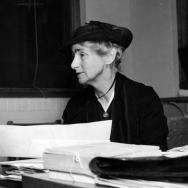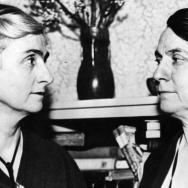The Mies van der Rohe-designed building that is home to the University of Chicago’s Crown Family School of Social Work, Policy and Practice has been dedicated in honor of Edith Abbott, a UChicago alumna who played a historic role as the School’s founding dean, was the first woman to lead a graduate school in the United States, and shaped a model of social work inquiry and impact that continues to this day.
Abbott, PhD 1905, was a scholar, researcher and innovator, who fundamentally reimagined the social work profession, revolutionized the social work curriculum, and advanced a bold vision that became the Chicago tradition of social work education. Her vision for a graduate school was unique: The school would advance the social work profession through a combination of practical theory, social science theory and research, and it would reflect the major social issues of the time.
The University celebrated the dedication of Edith Abbott Hall at a March 17 ceremony featuring UChicago leaders as well as Crown Family School faculty and alumni.
“As the dean of what we now know as the Crown Family School of Social Work, Policy and Practice, Edith Abbott and a few likeminded colleagues conceived and implemented a new vision and mission for the School, and for social work education more broadly,” said President Robert J. Zimmer in his remarks. “We are pleased to honor Edith Abbott’s fundamental contributions to the field of social work, and her enduring legacy at this University, by giving her name to the building that sits at the heart of the Crown Family School’s scholarly and educational activities.”
An innovative thinker
Abbott’s roots to Chicago and the University were deep. In 1905, she became one of the first women to receive a Ph.D. in economics from the University of Chicago. After continuing her education at the London School of Economics, she returned to Chicago to become assistant director of what was then called the Chicago School of Civics and Philanthropy. Abbott worked alongside towering intellectuals, including Sophonisba Breckinridge, PhD 1901, JD 1904, and lived at Hull House surrounded by the “Great Ladies of Halsted Street”—Jane Addams, Alice Hamilton, Florence Kelley, Julia Lathrop and her sister Grace Abbott.
As part of her strategic vision about the profession, she and Breckinridge led the then-independent School’s merger with the University in 1920—renamed the Graduate School of Social Service Administration—making it one of the nation’s first graduate schools of social work. That same year, she established the first Ph.D. program in social work in the U.S., which led the way in doctoral pedagogy among social work schools.
After her appointment as dean in 1924, Abbott refined the School’s curriculum, championing an interdisciplinary approach, including a solid foundation in the social sciences, statistics and policymaking—believing that students needed to learn more than casework to be effective administrators and leaders. To further advance the School’s commitment to scientific inquiry and evidence-based investigations, Abbott launched, with Breckinridge, the Social Service Review, which continues a tradition of examining a broad range of topics in social work, welfare and policy.
During her 18-year tenure as dean, Edith Abbott and the School were deeply involved with national policy in such areas as immigration, labor, child welfare and social security. Today, faculty and students at the Crown Family School examine the complex problems affecting society’s most vulnerable—from educational inequality to health disparities to child and family welfare—building upon Abbott’s legacy of field-defining research.
“The School and the social work profession owe a great debt to Edith Abbott, who understood that social change would happen only if rigorous research informed policy and practice,” said Deborah Gorman-Smith, dean of the Crown Family School and the Emily Klein Gidwitz Professor. “More than a hundred years ago, she advanced a bold vision that became the Chicago tradition of social work education—one that emphasized interdisciplinary scholarship and research as a way to advance a more just and humane world. It is fitting that our building honors this visionary who made such an impact on our field and our society.”
—Story also published on the Crown Family School website

